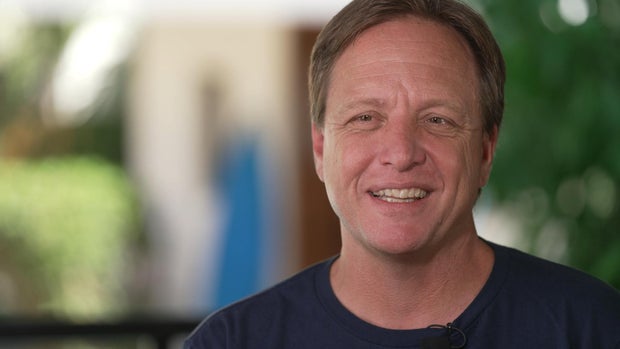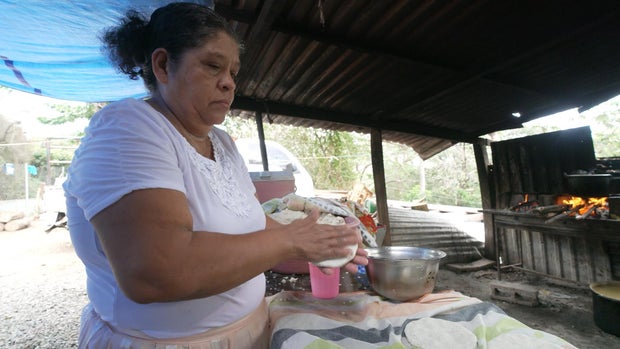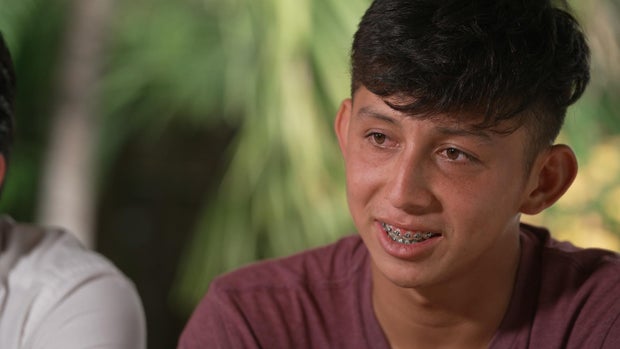If you feel like you’ve been hearing a lot about bitcoin lately, those aren’t voices in your head. Last month, in an attempt to skirt harsh financial sanctions, a top Russian lawmaker said Russia may start accepting bitcoin for oil and gas. If you watched the Super Bowl this year, you probably saw the ads for crypto-companies. And now, President Biden has turned his attention to digital assets, signing an executive order to examine the risks and benefits of cryptocurrencies. So we thought it was time to try and get our heads around the complicated world of crypto-currencies, specifically the largest one, bitcoin. To do that, we went to one of the simplest places in the world, a remote town known as “Bitcoin Beach.”
On the coast of El Salvador, about an hour from the capital is a town called El Zonte. Black volcanic sand gives way to warm water and an exceptional point break that draws surfers from around the world. But wander down El Zonte’s winding dirt roads and it’s easy to spot a different kind of tourist.
Sharyn Alfonsi: Do you surf?
Andreas Kohl: I don’t yet, but I might take it up here.
We met Andreas Kohl, visiting from Liechtenstein. He came to El Zonte because it’s one of the first places in the world you can use bitcoin to pay for just about anything – tamales, hotels or souvenirs.
Andreas Kohl: Bitcoin city’s happening here and it might be the next Singapore. I want to see it happen.
Singapore? It’s hard to imagine. The only traffic jams in El Zonte are caused by loose livestock. To understand how this remote town of 3,000 became part of a grand bitcoin experiment and how it all works, we were told to head to this break and look for a middle-aged blonde guy locals call “the man.” That’s him, Mike Peterson, an expat from San Diego with a degree in economics and nose for decent waves.
Mike Peterson: I wound up here on a surf trip, I think, like 18 years ago. Fell in love with the warm water, the nice waves, but most especially the people here.
Peterson, who once worked as a financial planner, moved to El Zonte a few years later and started helping those people. In 2015, he started, missionsake, a charity that supports missionaries and funded scholarships and created local jobs. At that time, most young people here left town or the country to find work.
Mike Peterson: That’s kind of the cycle that we’ve seen of destruction of people having to leave because there’s not enough opportunity. Then their kids are growing up without their parents here so they’re very vulnerable to the gangs. They join the gangs, the gangs grow and you have this kind of destructive cycle.
Roman Martinez: This is how we grew up here, like the opportunities were almost nothing.
Sharyn Alfonsi: You had to leave if you wanted to do something?
Roman Martinez: That was like the paradigm.
Roman Martinez grew up in El Zonte and started working with Peterson’s charity to help kids like Ismael Galdamez. He quit school at 13.
Ismael Galdamez: All I wanted to do is to work hard and to live, that’s it. Not about my future.
Sharyn Alfonsi: It was just surviving the day, getting through the day.
Ismael Galdamez: Exactly, as my parents did. It’s sad but it’s the reality.
But then in 2019, El Zonte got an unexpected break. Peterson says he was introduced to someone representing an anonymous donor with a fortune in bitcoin who wanted to see it put to good use – with one stipulation.
Mike Peterson: The stipulation was you can’t just convert it into dollars because they believe the actual usage of bitcoin would be what would benefit the people. And so for me, it was, like, wow, this is somebody that wants to actually see a circular economy generated using bitcoin and they’re willing to actually put the funds behind it.
Peterson and a team of community leaders got to work, creating the “Bitcoin Beach Initiative.” They used the anonymous donation to create dozens of much needed jobs in El Zonte. But they’d have to pay everyone in bitcoin.
Sharyn Alfonsi: Be honest. What did they say when you brought up let’s use bitcoin?
Mike Peterson: First they just kind of looked at you with this blank stare, like, ‘Well, show me these bitcoins, and – and how do – how do you hold them? And what do they look like?’
All fair questions without an easy answer. But Mike Peterson offered his neighbors and us his best explanation to what might be the most challenging question of all.
Sharyn Alfonsi: What’s bitcoin?
Mike Peterson: So bitcoin is the – the world’s first decentralized money that’s not controlled by any government. There’s no gatekeepers in it. It’s, you know, obviously lives on the internet. It can be transferred in electronic form, that actually lets people own it themselves, truly own it.
In other words, it’s peer- to-peer digital money, there isn’t a bank or third party in the middle. Banks have never really been part of the equation for most Salvadorans – about 70% of the country is unbanked. That means they have limited access to loans, mortgages or credit cards. Cash has always been king, which made convincing people in El Zonte to work for bitcoin, a currency they couldn’t hold or see, especially difficult. So, Mike Peterson and his partners turned their attention to a group much more comfortable with all things digital – teenagers. Ismael Galdamez was one of the first hires.
Mike Peterson: So we were hiring them to do things in the community – pick up trash out of the river – and then we’d pay them in bitcoin. And so, they got into this rhythm of going out and working and earning bitcoin.
Sharyn Alfonsi: And so you’re giving them the bitcoin, but did they have anywhere to spend the bitcoin?
Mike Peterson: That’s always the challenge when you’re trying to bring a new system into place. You know, the chicken and the egg problem.
Enter Mama Rosa. Under a tin roof and over an open flame she runs a popular pupusa spot in town. Her son, Jorge works with Mike Peterson and convinced “Mama” to be the first in El Zonte to accept bitcoin.
Sharyn Alfonsi: Did she say, ‘Where’s the money?’
Jorge Valenzuela: Yeah, she say, like, ‘OK, If you pay me, but how can I see it? When I touch the money?’
Sharyn Alfonsi: Yeah. And she just had to trust you?
Jorge Valenzuela: Yeah. So she say, ‘You can come and teach me.’
Here’s how it works. Customers scan her QR code. Then, using a popular phone app called “Bitcoin Beach,” instantly transfer bitcoin from their wallets to hers, which she keeps in her apron. Mama Rosa used her bitcoin savings to buy a truck and two cows. The grandmother of 18 is now bullish on bitcoin.
Sharyn Alfonsi: How do you feel about being a pioneer of technology?
Mama Rosa: laughs
Sharyn Alfonsi: You like it.
But not everyone in town has bought in.
Sharyn Alfonsi: Aceptas bitcoin?
Shop owner: No.
Sharyn Alfonsi: No … Can I ask you … do you accept bitcoin?
Shop owner: No.
Because bitcoin is complicated. It’s not backed by a government authority. There’s also concern about the computer power or energy needed to support bitcoin’s underlying network. Most people don’t buy a whole bitcoin, but a fraction of one. It’s largely unregulated and extremely volatile. There is only a limited supply so its value swells and dips based on demand.
Bitcoin was introduced in 2009. A year later, a single bitcoin was valued at pennies. Its value inched up and down, peaking last November at almost $70,000 a bitcoin, only to lose around 30% of its value in the last few months.
Sharyn Alfonsi: What happens when it drops 20%? And that’s a big deal to a person or a shop owner here. Are they knocking on your door going, ‘Hey, what’s up?’
Mike Peterson: Not knocking on the door but, you know, they’ll call Jorge and, like, ‘Hey, what – what’s going on?’ And so then we’ll kinda connect them with people who’ve been in this from the beginning. They’ve seen, like, ‘Yes, there’s ups and down volatilities along the way, but over the long-term perspective, it’s going up in value against the dollar.’
Sharyn Alfonsi: You’re not doubling down on this because you personally can get rich?
Mike Peterson: I will benefit if the price of bitcoin goes up, but I can’t impact that. I can’t influence that. That’s not the driving reason behind this. The reason is we want to see El Zonte transformed.
About 45 businesses are now riding the bitcoin wave in El Zonte. You can pay your dentist, the electric bill or for a cup of coffee with bitcoin.
Sharyn Alfonsi: So I put in $2 and send?
Roman Martinez: Send, yes.
Mike Peterson and his partners used bitcoin to help pay for this continuing education center. There are computer and English classes.
Teachers are paid in bitcoin. All of it’s attracted good press, bitcoin tourists and a few hoodie-wearing tech entrepreneurs.
Jack Mallers: Yeah, so we had gone to El Salvador just to prove that our product worked and prove that we could be better at Western Union than Western Union.
Jack Mallers is a 28-year-old CEO from Chicago who developed an app called “Strike,” designed to disrupt one of the biggest businesses in El Salvador – remittances, money sent from overseas. Last year, Salvadorans received more than $7 billion through services like Western Union, which can charge upwards of 10% for a transfer that can take days. Using bitcoin’s digital infrastructure, known as “rails,” the Strike app allows users to send U.S. dollars across borders instantly, for pennies.
Jack Mallers: We launch it. It gets one download a day, then it gets 100 downloads a day. Then it gets 1,000 downloads a day. Then it gets 20,000 downloads a day.
Then, Mallers got an unexpected message on his phone.
Sharyn Alfonsi: You get a direct message on Twitter from who?
Jack Mallers: The brother of the president.
Sharyn Alfonsi: And he wants to meet with you.
Jack Mallers: He wants to meet with me. And he gave me 24 hours.
El Salvador’s populist President Nayib Bukele once referred to himself as “the world’s coolest dictator.” He’s been accused of illegally grabbing power and ordering soldiers to occupy the nation’s legislative assembly to push through his agenda.
Jack Mallers: It was scary. It was really scary. I thought there were likely two outcomes – is that they were not happy with me interfering with the financial system in El Salvador or they were tremendously happy and bought into the vision that this was representative of a better world for not only El Salvador but the planet.
His utopian blueprint for bitcoin led to, “months of conversations with the government,” that led to this. Last summer at a bitcoin conference in Miami, Bukele announced in a video message that El Salvador would become the first country in the world to adopt bitcoin as an official currency, alongside the U.S. dollar.
Sharyn Alfonsi: It wasn’t discussed among lawmakers or—
Luis Membreño: Never.
Sharyn Alfonsi: No debate?
Luis Membreño: We never heard anything before that day.
Luis Membreño is an economist based in San Salvador and an outspoken critic of President Bukele’s policies.
Luis Membreño: The government wants people to think that this can be a currency. But this is just an asset and a speculative asset with a huge volatility. Imagine the U.S. dollar having a volatility of 20% in one day; would be crazy.
El Salvador is billions of dollars in debt and has long relied on loans from the International Monetary Fund to prop up its economy. In January, the IMF expressed concern about the risk of bitcoin’s volatility and has delayed further relief to El Salvador. But Bukele is doubling down – he’s spent an estimated $400 million of taxpayer money to push bitcoin into circulation. Protests followed.
Sharyn Alfonsi: He’s calling himself the CEO of El Salvador. What kind of CEO do you think he is?
Luis Membreño: Unresponsible one. An immature one.
Sharyn Alfonsi: But isn’t Bukele kind of a genius in a way, because he’s changed the narrative. You know, we’re not talking about the gang problem. We’re talking about, ‘Look what they’ve done with bitcoin.’
Luis Membreño: Yeah. Definitely. And he’s so good at it. The problem is that there’s going to be a day in which people will find out that the government is indebted, that they will increase taxes to everybody and that the party is over.
In El Zonte, 19-year-old Ismael Galdamez doesn’t worry about a wipeout. He’s teaching surf lessons and back in school. And when he learned the shaved ice vendors in El Zonte were going 30 minutes out of town to buy ice, he decided to become the ice supplier in town and used his bitcoin profits to buy this freezer.
Ismael Galdamez: It was $200.
Sharyn Alfonsi: And you cut those guys out of the ice game?
Ismael Galdamez: Exactly.
Sharyn Alfonsi: You’re a shark.
Ismael Galdamez: Yes.
A bitcoin shark in braces. Ismael is planning to move his parents and siblings into this new house in El Zonte later this month. He plans to pay the mortgage in bitcoin.
Produced by Michael Karzis and Katie Kerbstat. Broadcast associate, Elizabeth Germino. Edited by Craig Crawford.








